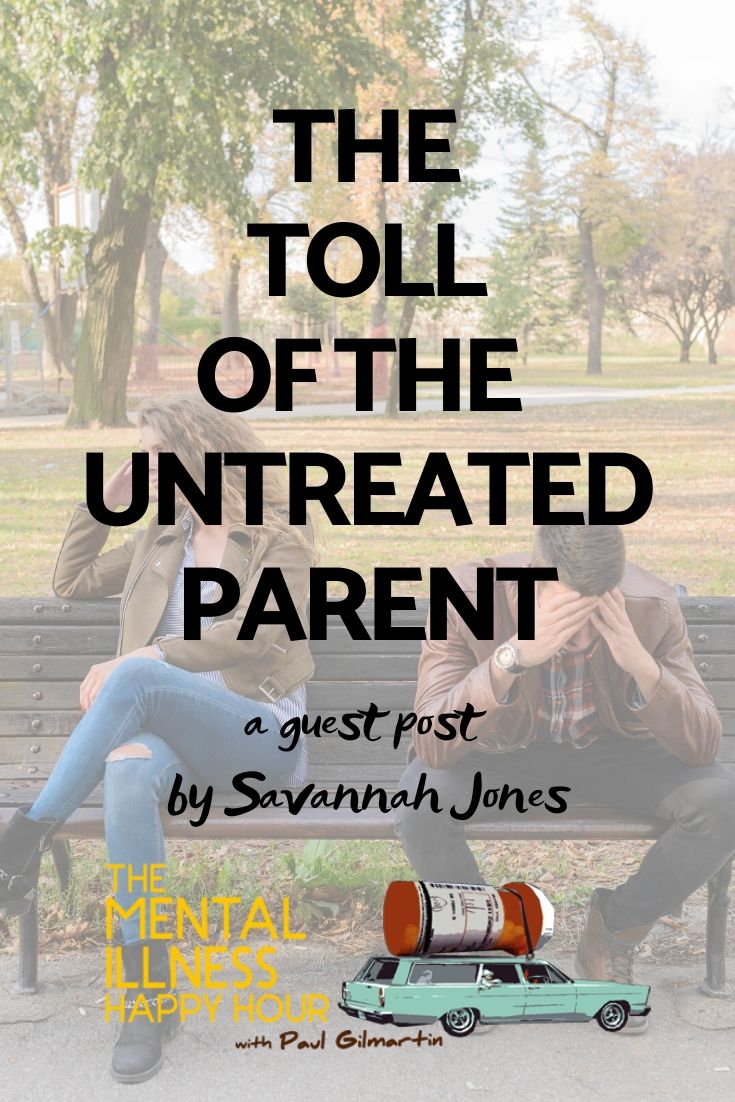Damaged: The Toll of an Untreated Parent
This is a guest post by Savannah Jones. All opinions are those of the author and do not necessarily reflect the opinions of the Mental Illness Happy Hour. Please consult a medical professional for your mental health needs.

Damaged: The Toll of an Untreated Parent
Most often, when asked about my father, I refer to him as a variety of colorful names including sperm donor and abusive-son-of-a-bitch….no, I am not bitter…not at all.
This less than friendly opening is because I spent all of my childhood being abused or manipulated by this man, even after he was diagnosed and medicated. Now, looking back, these horrors shaped my character and made me the strong-willed, fighter that I turned out to be. But that is only if I am looking for a positive light to shed on this story.
My father was told many times that he needed to seek help, but unfortunately, like many sufferers of mental illness, he did not want to admit he had a problem. He did not seek help until much after my parents divorced and I lived many states away from his temper. He was diagnosed with Bipolar Disorder and began a lithium-based medication that subdued a great deal of his manic fluctuations, but even after he was diagnosed it was those years he was untreated that I could not undo.
The truth is that my father’s undiagnosed and untreated mental illness came with many ramifications for my life that I may never fully unpack. As I get older I realize that many pieces of my personality are tethered to my experience growing up with someone so wholly unpredictable. One of the most prevalent effects is my general lack of trust. It is not just people, but situations and relationships that I simply cannot trust. I find myself second-guessing my family members, wondering if my friends hate me when they don’t answer immediately, and even wondering if strangers across a room are talking about me.
This lack of trust in my surroundings is because of the unpredictability of my father. Children need stable, predictable parents to form the groundwork of trust. I only had one parent who was either of those things. Unfortunately, I was never able to predict which father I would be dealing with from hour to hour. Sometimes my father was my hero saving me from cracking my skull on the pavement. Other times he was my mother’s abuser and the single scariest thing I thought existed. The inability to trust a parent breaks the foundation of trust that a child is supposed to build. I became aware at an all too young age that even people who say they love you can still cause you harm.
Because I feel that I cannot fully trust the people or situations around me, I need to control every detail.
Group projects? Hard Pass!
I physically cannot make my brain agree to let anyone else have control.
I was so young that I did not understand why or how my father could be so cruel seemingly at the drop of a barbie, so I began to attempt perfection. Making mistakes was simply not allowed in his eyes. I pushed myself to be the perfect daughter who made perfect grades and kept my room exactly in order.
No matter how perfect I was, with each outburst, the stakes for me increased. Every violent rage added another thing to my list of things I was doing wrong. At times it felt like there was a way I could breathe wrong in his presence. This overbearing weight I was carrying to be perfect to keep him “happy” led me down a very high-anxiety path where I could not cope with poor grades or loss.
One of many symptoms of a manic episode is narcissism. My father was an extreme narcissist who believed my entire existence revolved around him. For much of my childhood, it in fact did! I learned to play along and feed his ego in an attempt to avoid triggering him. Through my younger years, I was not very successful but as I got older I learned to think my way around him in most instances. This was the point where my father’s abuse turned from physical violence to mental destruction. He controlled my holiday plans, my weekends, and any chance I had at a social life as a pre-teen.
As a teen, I lived many states away from my father and our relationship was contained to phone calls on the weekend. Over time his control lost its grips and he sought a diagnosis for his outbursts. His Bipolar Disorder had taken away from my childhood and caused my mother and me irreparable damage. As an adult, I still flinch and often cry when a man raises his voice or hand in the same room as me.
Because of his untreated illness, I do not trust the world around me or allow people to help me do things.
Because I share his genetics, I have Bipolar Disorder too.
My diagnosis came at age 19 and it immediately made me fear to become the monster my father was. I feared I would abuse my future family, or harm myself daily. Two years after my diagnosis I elected to no longer carry a relationship with my abuser because it was the best choice for my mental health. The damage he caused took my childhood away from me and on many occasions nearly took my mother and my life. After years of hoping that his treatment would lead to an apology, I quit extending him the opportunity.
Years after being diagnosed myself, I chose to live a lifestyle tailored to making my mental health a priority. This choice is not just for myself but for the people around me. I will never let my illness be an excuse for causing the people around me irreparable damage. Never.
 Currently, Savannah Jones is a chiropractic student at Life University focused on her mental health and how chiropractic care can influence mental health and wellness. She has Bipolar I Disorder and hopes that sharing her story can help others.
Currently, Savannah Jones is a chiropractic student at Life University focused on her mental health and how chiropractic care can influence mental health and wellness. She has Bipolar I Disorder and hopes that sharing her story can help others.
She can be found blogging at The Jade Tree.


Herpezine
11/26/2020 at 11:10 pmThank you for sharing your honest experience. I have a cousin and she was also diagnosed with this illness. You can also battle it if you are doing meditating. It makes you feel calm.